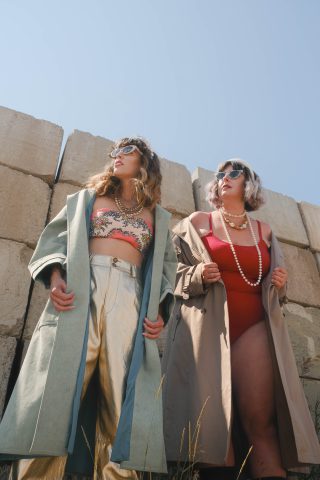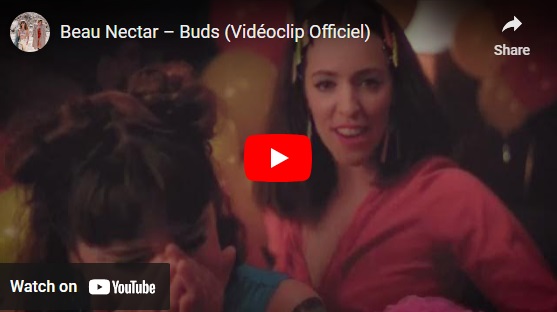 Marie-Clo and éemi each have their own, separate, musical project, but when they work together, they become Beau Nectar, a bilingual electro-pop affair that tackles topics like feminist issues, or nature. Indica Records recently released their album Two Lips, a universal, accessible representation of eco-feminism.
Marie-Clo and éemi each have their own, separate, musical project, but when they work together, they become Beau Nectar, a bilingual electro-pop affair that tackles topics like feminist issues, or nature. Indica Records recently released their album Two Lips, a universal, accessible representation of eco-feminism.
Franco-Ontarian and Franco-Saskatchewanian, respectively, Marie-Clo and éemi met through a musical competition presented by the now defunct BRBR TV show, hosted by TFO.
“Then, the pandemic separated us and made us want to write an album as a duo,” Marie-Clo explains. “We wanted to express how passionate we feel about nature, and its fauna and flora.” Beyond their shared interests, especially in feminism, they took their quest for knowledge a step further by pursuing Gender Studies at the University of Victoria, training in herbal medicine, and recording in the woods – to tie it all together.
Each in their own province, they were able to take Beau Nectar forward as if there was no physical distance between them. “The technologies that emerged during the pandemic really helped us forget the physical distance,” says éemi. “With Zoom and Google Drive, we strive to get as many creative residencies together as possible, but everything else is do-able.” Among the songs on Two Lips, “À fleur de pot” tells the story of a houseplant that dreams of living outdoors. “I wrote that during the pandemic,” explains Marie-Clo. “We were stuck inside and we couldn’t wait to go out.”
The two partners explore the world through a shared vision: “Woman and nature under the capitalist and patriarchal umbrella,” says éemi. “We love to improvise when we get a chance to get together,” adds Marie-Clo. “We love effects pedals, we record ourselves and try all kinds of stuff. We have less and less creation time because of touring, but we tour because our project is successful, so it’s a good thing.” éemi adds, “It’s when you’re noodling around that the best ideas come out.” There’s one recommendation to remember.
The women are free, and thrive in the role of being a bilingual musical project outside of Québec. “We want to avoid being the token artists at all costs,” says Marie-Clo. “Beau Nectar is bilingual without being Québécois, so it’s different. We represent confidence in our linguistic insecurity. We couldn’t be prouder that French is our first language, even though we’re from Canadian provinces that are largely Anglophone.”
Well aware that making music in English only would afford them a much wider audience, they’ve still decided not to go that route. “We don’t need to write in English to be successful,” says éemi. “A lot of Francophiles love what we do, and that makes us very proud. We love all the possibilities French words give us.”
Music is often presented in rigid boxes, but the two singer songwriters don’t subscribe to that approach. “When we were in France, I thought they’d talk about our strange accents, but they love our melodies – and that’s what they talked about, in the end,” éemi remembers. “When we played Phoque Off [in Québec City], we expected to be the ‘from outside of Québec’ act, but everyone kept stressing how our project is important because it’s an alternative one led by two women.”
They flex their strengths even more through their rhythms, and brilliant word plays. “I’m a dancer, a choreographer, and an actress, and that profoundly influences my stage persona,” says Marie-Clo. “éemi is strong in acting, and she’s extremely talented in design, editing, and video projections onstage.”
Their voices work together like two pieces of a puzzle, so much so that they’re often asked if they’re sisters. (They’re not.) In feminine solidarity, they shatter the false assumption that talented women have to be in competition with each other. “We met in a competition and we had compatible energies,” éemi remembers. “Society encourages us to feel intimidated by each other. We realized we were both careerists, and that a joint project could take us even further.”
